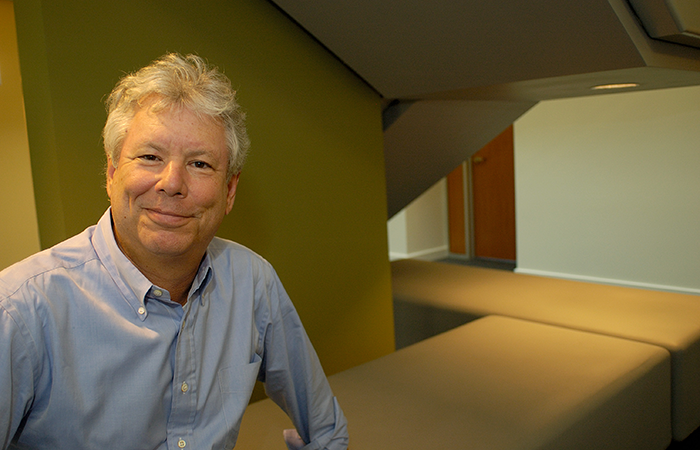Thaler’s Economics Nobel: A Nudge Towards Neoliberal Economics

On 8 November 2016, within minutes of Indian Prime Minister announcing the demonetisation of 86% of currency, Richard H.Thaler Professor of Behavioral Science and Economics, University of Chicago Booth School of Business tweeted:
This is a policy I have long supported. First step toward cashless and good start on reducing corruption. https://t.co/KFBLIJSrLr
— Richard H Thaler (@R_Thaler) November 8, 2016
This is a policy I have long supported. First step toward cashless and good start on reducing corruption.
When somebody informed him that the govt. was planning to introduce Rs.2000 currency notes, he tweeted “Really? Damn”
The same Prof. Thaler has won this year’s Nobel Prize for economics, though not for his support for the disaster of demonetisation in India (that only shows his tenuous links with realities). He wins the prize for his having "built a bridge between the economic and psychological analyses of individual decision-making". His empirical findings and theoretical insights have been instrumental in creating the new and rapidly expanding field of behavioral economics, which has had a profound impact on many areas of economic research and policy according to the official press release.
What’s does all this mean? Classical economics held that individuals make decisions based on rational self interest. This was nothing but a justification of capitalism where everybody is competing against everybody and the invisible hand of the market is supposed to be controlling everything.
However, as world history had repeatedly shown this theory was not working. Capitalism and the market were only working in favour of the propertied classes at the cost of the labouring ones.
In the 1980s, with the rise of neoliberalism, a new economic theory arose from supporters of capitalism. This was called behavioural economics. Its leading lights were Daniel Kahneman, Amos Tversky, Robert Shiller, Senthil Mullainathan, Cass Sunstein - and this year’s Nobel winner Richard Thaler.
These people argued that people often behave irrationally (they don’t say so but what they mean is people behave foolishly) and not in their self interest as posited by the classical economists. They documented hundreds of such cases in the real world. And, they harnessed psychology, cognitive science, anthropology, sociology etc. to build their alternative model, called behavioural economics.
This would have remained an entertaining parlour game – explaining all kinds of weird behaviour from binge drinking to dog fights of striker planes – except that the steel fist under the velvet glove was revealed pretty quickly.
Behavioural economics became the favourite tool of neoliberal regimes to manage poor people, whose numbers and anger was growing every day. Poor people often act foolishly, the behavioural economists and their supporters argued, and government policy needs to take this on board to devise suitable policies to ‘nudge’ them into taking the right decisions.
This step served two purposes: it shifted the attention away from systemic reasons for existence of poverty, unemployment, etc. and it freed governments from spending money on their alleviation. If the poor were poor because of their own foolishness, all the government needed to do was to ‘nudge’ them through quiet suggestion and psy ops towards taking the right decisions.
Thaler emerged as the poster boy for this unashamed apologia of neoliberalism. His bestselling book “Nudge: Improving Decisions about Health, Wealth and Happiness” (2008) urged that governments should take small easily understood steps to gently push people into making better choices. For instance, a study was quoted to show that people in need of cash acted more irrationally than those with cash – another way of saying that the poor are stupid. So, when delivering a cash benefit to them, you can accompany it with messages for, say, schooling of girl child or other desirable things. If the messages are delivered before they get cash, the poor will simply junk them.
Nudge became so liked by the Western governments that in UK a Nudge team was set up and then a working group was organised in the US based on the UK group’s experience. Governments in Brazil, France, Australia, and New Zealand claimed they were incorporating behavioural economics in their policy making. In the US, the real face was further unveiled when tax cuts in 2009, contribution based investment plan for healthcare, retirement savings investments and many such financial measures all claimed inspiration from nudge theory. In the name of helping they were nudging people to remain shackled to the financial oligarchy.
Has ‘nudging’ ever succeeded or even been tried out for the rich, the one-percenters? Has any billionaire been nudged into giving up his or her wealth? There are no studies or evidence for this. The behavioural economists will probably say that the economic behaviour of the rich is not irrational so they don’t need nudges, forgetting about the 2008 financial crisis, caused by irrational greed of the wealthy.
Another implication of the behavioural economics framework is that it provides a tool for the managing the social and political consequences of the widening income gap between the 1% and the 99%. This is the raison d’être of the whole shebang. Thaler and his colleagues and followers have developed a whole corpus of literature recording the behavioural traits of the poor and how to handle them in a way that pushes them to conform, accept and surrender.
It is small wonder that the Nobel Prize goes to this standard bearer of neoliberalism, who is all the more precious because he appears to be more sympathetic, more understanding and more knowledgeable of the poor and deprived, who seems to think in their favour.
In India, we need to be watchful because the Modi govt. has its own little version of ‘nudging’ people to take ‘right’ decisions. Except that Modi believes in shoves rather than nudges. Look at demonetisation: it was a shove to people to embrace cashless economic transactions. That’s why it drew instant praise from Thaler. Direct cash transfers, is another shove because, it is argued, that people are corrupt and stupid.
Disclaimer: The views expressed here are the author's personal views, and do not necessarily represent the views of Newsclick.
Get the latest reports & analysis with people's perspective on Protests, movements & deep analytical videos, discussions of the current affairs in your Telegram app. Subscribe to NewsClick's Telegram channel & get Real-Time updates on stories, as they get published on our website.
























